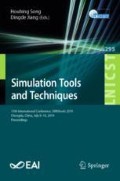Abstract
This paper is based on the exploration of the effective method of erroneous phoneme pronunciation of Chinese mandarin learners whose mother tongue is Uyghur and the solution of major problems of language education, concerning the learner’s pronunciation, it uses a different method, namely data-driven approach, and the Automatic Speech Recognition (ASR) is also used to recognize phonemes of the pronunciation of Chinese mandarin learners whose native language is Uyghur. The phoneme sequence is identified and then the standard pronunciation phonemes corresponding to the recognized phonemes are used as the target phonemes to obtain the mapping relation of each target phoneme and recognition phoneme, thus the possible phoneme error categories and possible erroneous rules in Uyghur learners’ pronunciation can be obtained, which may give some help to the Uyghur learners to learn the Chinese auxiliary language system and the corresponding pronunciation evaluation model.
Access this chapter
Tax calculation will be finalised at checkout
Purchases are for personal use only
References
Ito, A., Lim, Y.-L., Suzuki, M.: Pronunciation error detection for computer-assisted language learning system based on error rule clustering using a decision tree. Acoust. Sci. Technol. 28(2), 131–133 (2007)
Stanley, T., Hacioglu, K.: Improving L1-specific phonological error diagnosis in computer assisted pronunciation training. In: INTERSPEECH 2012 [S.l.]: ISCA, pp. 827– 830 (2012)
Jiang, D., Wang, W., Shi, L., Song, H.: A compressive sensing-based approach to end-to-end network traffic reconstruction. IEEE Trans. Netw. Sci. Eng. (2018a). https://doi.org/10.1109/tnse.20182877-597
Wang, Y.B., Lee, L. S.: Improved approaches of modeling and detecting error patterns with empirical analysis for computer-aided pronunciation training. In: ICASSP 2012 [S.l.], pp. 5049 –5052. IEEE (2012)
Jiang, D., Zhang, P., Lv, Z.: Energy-efficient multi-constraint routing algorithm with load balancing for smart city applications. IEEE Internet Things J. 3(6), 1437–1447 (2016)
Witt, S.M.: Use of Speech Recognition in Computer-Assisted Language Learning. [S.l.], Cambridge University (1999)
Ye, H., Young, S.J.: Improving the speech recognition performance of beginners in spoken conversational interaction for language learning. In: INTERSPEECH 2005. [S.l.]: ISCA, pp. 289 –292 (2005)
Jiang, D., Huo, L., Song, H.: Rethinking behaviors and activities of base stations in mobile cellular networks based on big data analysis. IEEE Trans. Netw. Sci. Eng. 1(1), 1–12 (2018b)
Qian, X.J., Meng, H., Soong, F.K.: On mispronunciation Lexicon generation using joint sequence multigrams in computer-aided pronunciation training (CAPT). In: INTERSPEECH 2011. [S.l.]: ISCA, PP. 865 –868 (2011)
Ladefoged, P., Johnson, K.: A Course in phonetics, 7th edn. Peking University Press, Peking (2015)
Thurgood, G., LaPolla, R.J.: The Sino-Tibetan Languages. London Routledge, China (2003)
Zhao, X., Zhu, Z.: Uyghur Language. National press, China (1985)
Shifeng, F.: Experimental Phonology Exploration. Peking University Press, China (2009)
Lo, W.K., Zhang, S., Meng, H.M.: Automatic derivation of phonological rules for mispronunciation detection in a computer-assisted pronunciation training system. In: INTERSPEECH 2010, pp. 765– 768 (2010)
Troung, K.: Automatic Pronunciation Error Detection in Dutch as a Second Language: an Acoustic-Phonetic Approach, Utrecht University (2004)
Dong, B., Zhao, Q.W.: Automatic scoring of flat tongue and raised tongue in computer-assisted Mandarin learning. In: ISCSLP2006. [S.l.]: IEEE, pp. 2–7 (2006)
Wang, S., Li, H.: Research on the evaluation of spoken language scale intelligence for second language learning. Chin. J. Inf. Sci. 25(6), 142–148 (2011)
Gass, S., Selinker, L.: Language Transfer in Language Learning, pp. 22–113. John Benjamins Publishing Company, Amsterdam (1992)
Zhang, R.: Research on automatic evaluation method of Mandarin Chinese pronunciation. Harbin Institute of Technology, pp. 72–101 (2013)
Acknowledgments
This work was supported by the National Natural Science Foundation of China (NSFC; grant 61462085, 61662078, and 61633013).
Author information
Authors and Affiliations
Corresponding author
Editor information
Editors and Affiliations
Rights and permissions
Copyright information
© 2019 ICST Institute for Computer Sciences, Social Informatics and Telecommunications Engineering
About this paper
Cite this paper
Arkin, G., Hamdulla, A. (2019). Analysis of Phonemes and Tones Confusion Rules Obtained by ASR. In: Song, H., Jiang, D. (eds) Simulation Tools and Techniques. SIMUtools 2019. Lecture Notes of the Institute for Computer Sciences, Social Informatics and Telecommunications Engineering, vol 295. Springer, Cham. https://doi.org/10.1007/978-3-030-32216-8_45
Download citation
DOI: https://doi.org/10.1007/978-3-030-32216-8_45
Published:
Publisher Name: Springer, Cham
Print ISBN: 978-3-030-32215-1
Online ISBN: 978-3-030-32216-8
eBook Packages: Computer ScienceComputer Science (R0)

